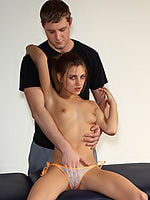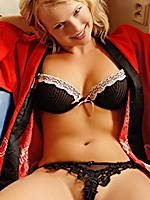- Afghanistan – "Baba Chaghaloo"
- Albania – "Babadimri"
- Australia – Best known as Santa Claus. Father Christmas and Saint Nick are also used.
- Austria – "Weihnachtsmann" (not "Nikolaus", who is celebrated on 6 December) Note: The Christkind (Christ-child) is the traditional giftbringer in most parts of Austria.)
- Armenia – "Kaghand Papik" (Կաղանդ պապիկ)
- Azerbaijan – "Shakhta baba" (Şaxta baba)
- Bolivia – "Papa Noel"
- Bosnia and Herzegovina – "Deda Mraz"/Деда Мраз meaning "Grand Father Frost" (related with New Year's Eve)
- Brazil – "Papai Noel"
- Bulgaria – "Dyado Koleda" (Дядо Коледа), earlier "Dyado Mraz" (Дядо Мраз)
- Canada – "Santa Claus", "Père Noël"
- Chile – "Viejito Pascuero"
- China – "Shengdan laoren" (Traditional Chinese: 聖誕老人,Simplified Chinese: 圣诞老人, Cantonese: "Sing Dan Lo Yan", literally "The Old Man of Christmas")
- Costa Rica – "Colacho" (from "San Nicolás"). Note: The "Niño dios" ("Child God", meaning Jesus) is the traditional giftbringer.
- Croatia – "Djed Božićnjak", also "Djed Mraz"
- Czech Republic – "Ježíšek", which means "Infant-Jesus", is the traditional giftbringer in Czech Republic.
- Denmark – "Julemanden", meaning "The Yule Man" which is the Danish equivalent to Santa Claus. "Jul" is also often translated "Christmas".
- Ecuador – "Papa Noel"
- Egypt – "Baba Noël"
- Estonia – "Jõuluvana"
- Faroe Islands – "Jólamaður"
- Finland – Finnish: "Joulupukki", Swedish: "Julgubben"
- France and French Canada – "Père Noël", "Papa Noël"
- Germany – "Weihnachtsmann" (not "Nikolaus", who is celebrated on December 6). Note: The Christkind (Christ-child) is the traditional giftbringer in Southern Germany.
- Greece / Cyprus – Άγιος Βασίλης ("Άyos Vasílis")
- Hungary – "Mikulás" or "Télapó" ("Winter Father")
- India – "Christmas Father", "Santa Claus"
- Iran – "Baba Noel"
- Iraq – "Baba Noel"
- Iceland – "Jólasveinar" or "Yule Lads"
- Indonesia – "Sinterklas"
- Ireland – Santy and Santa (Claus)
- Italy – "Babbo Natale" (traditional giftbringers are "Gesù Bambino" ("Child Jesus") on Christmas and/or Befana on January 6)
- Japan – サンタクロース (Romaji: "Santakurōsu")
| - Kazakhstan - Колотун Бабай ('Father Frost')
- Korea – 산타 클로스 ("santa keulloseu")
- Latin – "Pater Natalis" or "Sanctus Nicholaus"
- Latvia – "Ziemassvētku vecītis"
- Lebanon – "Papa Noël"
- Lithuania – "Kalėdų Senelis"
- Macedonia – "Dedo Mraz" (Дедо Мраз)
- Malta – "Christmas Father", "Father Christmas", "San Niklaw/San Nikola" ("Saint Nicholas"), "Santa Klaws" ("Santa Claus")
- Mexico – "El Niñito Dios" ("Child God", meaning Jesus)
- Mongolia – "Ovliin ovgon" (Өвлийн өвгөн, which means "Grandfather Winter" and is
- Netherlands and Flanders – "Kerstman" ("Christmas man")
- Norway – "Julenissen"
- Pakistan – "Christmas Baba"
- Peru – "Papá Noel"
- Philippines – "Santa Klaus"
- Poland – "Święty Mikołaj" (in Wielkopolska region it is rather "Gwiazdor")
- Portugal – "Pai Natal"
- Romania – "Moş Crăciun"
- Russia – "Ded Moroz" (Дед Мороз, which means "Grandfather Frost" and is associated mostly with New Year's Eve)
- Sápmi – "Juovlastállu"
- Sardinia – "Babbu Nadale"
- Serbia – "Božić Bata" meaning Christmas Brother (Божић Бата; related with Christmas), "Deda Mraz" meaning Grandpa Frost(Деда Мраз; related with New Year's Eve)
- Sri Lanka – "Naththal Seeya"
- South Africa (Afrikaans) – "Vader Kersfees" or "Kersvader", "Father Christmas" or "Santa Claus"
- Spain and some of Spanish-speaking Latin America – "Papá Noel" ("Daddy or Father Christmas") or "San Nicolás" or "Santa Claus". The gift bringers are the Three Kings on 6 January
- Slovakia – "Ježiško" or "Dedo Mráz"
- Slovenia – "Božiček"
- Sweden – "Jultomten"
- Switzerland – "Samichlaus"
- Turkey – "Noel Baba" (Note: In Turkey Noel Baba is related with New Year's Eve instead of Christmas.)
- Turkmenistan – "Aýaz baba"
- Ukraine – "Did Moroz" (Дід Мороз, associated with New Year's Eve) and "Sviatyj Mykolai" (Святиӣ Миколаӣ (Santa Claus), associated with St. Nicholas Day)
- United Kingdom – "Father Christmas", "Santa (Claus)", "Daidaín na Nollaig" (Gaelic), "Siôn Corn" (Welsh) and "Tas Nadelik" (Cornish)
- United States – "Santa Claus"
- Uzbekistan – "Qor bobo" (Which means "Grandfather Snow", and is related with New Year's Eve instead of Christmas.
- Vietnam - "Ông Già Noel" (Which means "Old man (of) Christmas")....
|














